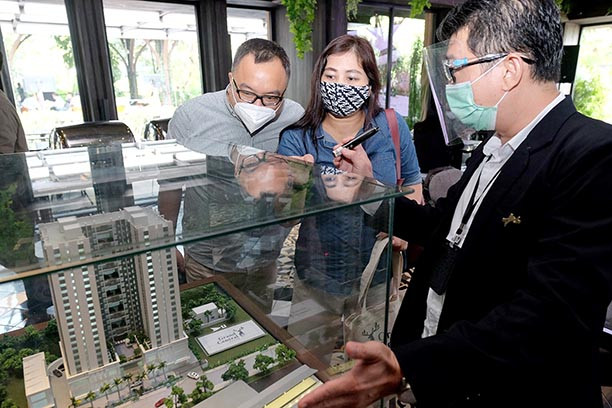Additional stimulus needed to boost property industry: Association
A combination of soaring unemployment and plummeting purchasing power has greatly affected the housing market, according to Bank Indonesia’s quarterly Residential Property Prices Index (IHPR) survey.
Change Size
 Potential buyers examine a miniature replica of the Grand Central Bogor apartment complex in Bogor, West Java. (JP/Dhoni Setiawan)
Potential buyers examine a miniature replica of the Grand Central Bogor apartment complex in Bogor, West Java. (JP/Dhoni Setiawan)
P
roperty developer association Real Estate Indonesia (REI) has urged the government to provide an additional stimulus that includes mortgage payment deferrals for developers and homebuyers as the current mortgage interest subsidy program is projected to falter.
Finance Minister Sri Mulyani Indrawati signed on Sept. 25 Ministerial Regulation No. 138/2020 on procedures for the National Economic Recovery program’s subsidy disbursement plan, which details provisions on the mortgage loan interest subsidy.
The interest subsidy, which ranges from 3 percent to 25 percent in the first three months of the loan depending on the debtor’s loan ceiling, is available for a maximum property size of 70 square meters. The program also limits the loan ceiling to Rp 10 billion (US$673,000).
“The interest subsidy will only result in substantial effects because it lasts for around three months. Meanwhile, many people now are being furloughed without a severance payment,” REI chairman Paulus Totok said during an online discussion held by marketing firm Markplus on Friday.
Paulus said mortgage forbearance would enable laid-off and furloughed workers to keep their mortgage despite losing their source of income, preventing massive defaults and house order cancellations.
“The government needs to take a meticulous look at the microeconomic data to understand the current conditions and implement the right policy,” he said.
Indonesia’s unemployment rate is projected to soar to 9.5 percent this year, up from around 5.2 percent last year, as millions of people lose their jobs amid the prolonged pandemic, according to Fitch Solutions.
Household spending fell 5.51 percent year-on-year (yoy) in the second quarter as the country’s gross domestic product contracted 5.32 percent during the period, Statistics Indonesia (BPS) data show.
The combination of soaring unemployment and plummeting purchasing power has greatly affected the housing market, according to Bank Indonesia’s quarterly Residential Property Prices Index (IHPR) survey.
According to the central bank’s survey, residential property sales remained in the negative territory with a 25.6 percent yoy decline in the second quarter.
The housing property price also saw a continuous slowdown with only 1.59 percent yoy growth booked in the second quarter, down from the previous quarter’s yoy increase of 1.69 percent.
Property developers needed additional stimulus from the central government and local administration in the form of tax cuts for final income tax (PPh), value-added tax (PPN), land and building tax (PBB) and land and building rights acquisition tax (BPHTB), Paulus said.
“There are 30 million workers that are employed in industries that are directly or indirectly linked to the property sector. Therefore, we have submitted a proposal [to the government] to rescue the property developers’ cash flow,” he said.
However, some developers have seen a silver lining to the economic turbulence.
Developer PT Sinarmas Land managing director Alim Gunadi said during the discussion that while office and retail property sales continued to decline, landed property had found its new equilibrium and was projected to become the first segment to rebound.
“If we take a look at the property cycle, the landed house industry is set to rebound quicker than the office and retail sectors,” he said.
The company’s subsidiary, PT Bumi Serpong Damai (BSDE), recorded Rp 2.9 trillion in marketing sales during the first half of the year, a 6 percent yoy increase, according to the company’s data.
Alim said young first-time homeowners aged 22 to 39 years old had become market drivers during the pandemic as property with a middle-lower price tag topped the demand.
“During the 2003 SARS epidemic, property sales dropped but they rebounded by 147 percent the next year. Hopefully we can see a similar V-shaped recovery,” he said.









